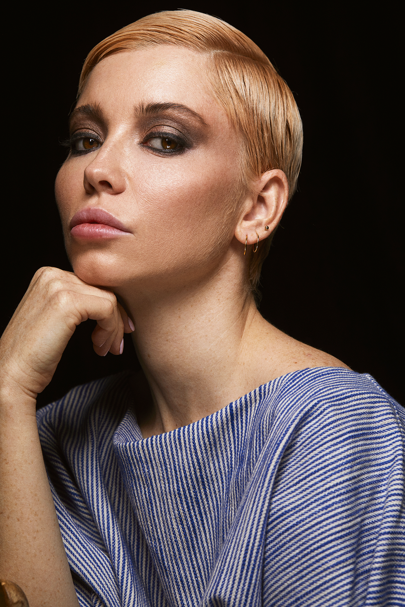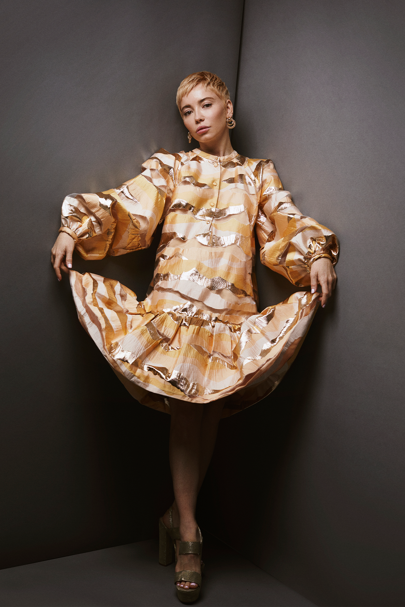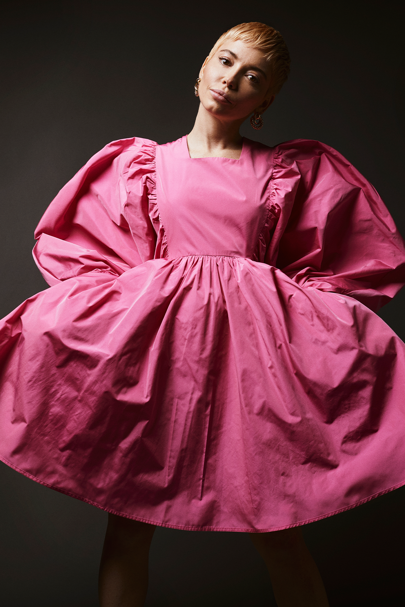There are celebrity journeys, there are X-Factor esque sob-story journeys and then this the remarkable journey of Marama Corlett, the 29-year-old actress poised to star in the big budget BBC America adaptation of Terry Pratchett’s Discworld novels, new TV show, The Watch.

Photographer David Reiss, Stylist Krishan Parmar at Carol Hayes Management, Make up Barrie Griffiths at Frank Agency using Nars, Hair Elvire Roux at Carol Hayes Management using Maria Nila
The Maltese-born actress was raised in the Unification Church or Unification Movement – sometimes called ‘The Moonies – a religious movement founded in the 1950s after its founder and leader, Sun Myung Moon said Jesus appeared to him during prayer and asked him to set up God’s kingdom on Earth. As a result, he labelled himself the Messiah and became famous for curating mass weddings, in which thousands of couples, many of whom had never met before, were paired together in huge stadiums.
Swapping island life in a religious movement for the world of acting – via stints at ballet school in Malta and London – couldn’t be more of a contrast. And now, after playing smaller roles in the likes of Guardians of the Galaxy and [i]His Dark Materials[/i], Marama is stepping into the spotlight in The Watch, playing a police officer who also just so happens to be a werewolf. Nothing is ever simple for this actress, clearly! Think of it as pure fantastical escapism with the comedic timing of Killing Eve.
Here Marama opens up – for the first time – about her remarkable life, her parents’ mass arranged marriage, the game-changing moment she moves to London, why she will never use the word ‘cult’ to describe her upbringing and how you never really leave the movement behind…

Photographer David Reiss, Stylist Krishan Parmar at Carol Hayes Management, Make up Barrie Griffiths at Frank Agency using Nars, Hair Elvire Roux at Carol Hayes Management using Maria Nila
The Watch is such a dream project – talk me through your role…
I play Angua Von Uberwald, who is a member and a corporal with the City Watch. Essentially we are a bunch of misfit cops who are living in this city where crime has been legalized. They’re living in this kind of a city that’s stagnant, and her role has been taken away from her. So when we first meet her in episode one, she’s sitting around, bored, shooting pigeons and laying low. But as the story unfolds, we find out that she’s staying low because she’s protecting herself and her friends. Oh and she’s a werewolf!
She’s got a lot of problems and she’s a werewolf, it’s a tough life!
Yes! She’s struggling with her duality throughout the story, and trying to figure out who she is and where she fits in in this world.
Angua Von Uberwald is dealing with this dual identity – what have been some turning points in understanding your own identity?
Well, I grew up in Malta, which is a very tiny island. It was quite a conservative upbringing as it is an extremely Catholic country. In England, you have a pub on every corner, in Malta, you have a church on every corner. My mother is Maltese and my father’s from New Zealand. My parents joined a spiritual movement in the 1970s known as the Unification Church. Some people call them the Moonies. Some people would call it a cult so I was born into this new way of living that my parents had found. My parents also had an arranged marriage in New York City, in Madison Square Garden and there were 4,000 couples getting married all at the same time.
The leader of the movement put these people together. I always joke with my parents, that it’s kind of like a 70s-80s Tinder but I think my parents were searching for something. They were finding a place where they felt like they belonged and searching for something higher. So growing up in Matla I grew up with this sense of duality, having these two teachings – between my parents religious movement and the catholic church. I always felt a little bit like I was carrying a secret all the time.

Photographer David Reiss, Stylist Krishan Parmar at Carol Hayes Management, Make up Barrie Griffiths at Frank Agency using Nars, Hair Elvire Roux at Carol Hayes Management using Maria Nila
What was the experience like growing up between two very different religions?
I remember when I was young, and I went to the catechism classes to do my Holy Communion – which you had to do in Malta. I was at the back of the class and the teacher was explaining how Jesus died for us and I put my hand up saying, “Jesus was murdered and the Messiah is here.” The nun took me to one side and said, “Who’s telling you these things?” She probably thought the devil went into me. She gave me a statue of the Holy Mary and she said, “Walk home, say Hail Marys until you get home. And pray that Jesus forgives you.” So I just walked home with the Holy Mary statue. Since I have read about many people who have grown up in different new religions, movements or cults, and so on and they’re so expressive about the way they feel. But I think I’m still processing things myself. I’m still trying to figure all that out.
When you use the word ‘cult’ I think a lot of people have a lot of preconceptions about what that word means. What do you think is the biggest misconception of that existence that you led and that idea of what cult is?
It’s a tough one, which I’m still trying to figure out and that’s why I don’t say cult. It can mean so many things. The word cult, for example, was never used. I would never use the word cult, either because I know my parents don’t use it.
How do you feel having left that world behind?
I don’t think you ever really leave. My parents have their beliefs, and I have respect for them. You don’t sign any papers to leave. Everyone’s looking for different ways to cope in life. We live in such a strange world. We’re all looking for meaning and whatever that is to you, do it.
Do you think you found your meaning in going into acting?
I started off doing classical ballet, and that was always a therapy in many ways. I just didn’t know it. It gave me a safe space to express myself. At ballet school I was doing a Russian style of training, and it was extremely expressive. Of course, it has its rules, but it was mainly about dancing from your heart. But as time went along, I started to feel this sense of wanting to use my voice and to learn to use my voice so acting seemed like the next form of expression. In Malta, we only had a couple of television channels, and most of them were Italian because we were so close to Sicily so I grew up watching classic Italian movies like Fellini and De Sica. I always thought, “Wow, it’s so beautiful how they can express their emotions over and over again. It’s so real and it was because they had really been through the war, along with a lot of pain.
Like your parents went to go find that belonging in the movement have you found that in acting and dancing communities?
Definitely, yes!
When you moved to London from Malta was it a massive culture shock?
Definitely. We don’t even have trains, or lakes or forests, or anything on the island. So, even that was just exciting, getting on a train. I had this mentality that I’m coming here and I’m going to work hard and I had three different jobs, maybe four. I was a cleaner, I was an usher at the cinema, I was a waitress and I was also selling things door to door, like handmade cards. I was just trying to make money, trying to survive while studying ballet. I think I had like 600 pounds when I got here and was staying in a sleeping bag for the first couple of months before buying a duvet.
Those negative things are the things that ultimately empower you though don’t they?
My parents were a wonderful example of that, because they always had this sense of mission, the sense of working hard towards a goal and from nothing, creating something. They were very encouraging with my ballet. They really pushed for me to do that. But London can be a scary place and it’s not easy to make friends. It takes time for people to trust.
What kind of advice would you want to give to the ‘you’ arriving in London for the first time if you could go back in time?
I’d say, face your fears. You’re going to be fine and it’s extremely rewarding.Everyday on the outside, we’re always so composed and tough. But on the inside, we’re all facing our fears. That’s what we all have in common and it’s not until we accept ourselves that the fear goes. It’s a process.
Would younger ‘you’ believe that you were going to star in a BBC drama?
No way! You can cross the island in an hour. The choice was between living a comfortable life on the island – a traditional life – get married, have kids, stay on the island. Or, leave and face my fears, and just explore the world and meet humans. It’s exciting!
The Watch is showing on BBC America now

